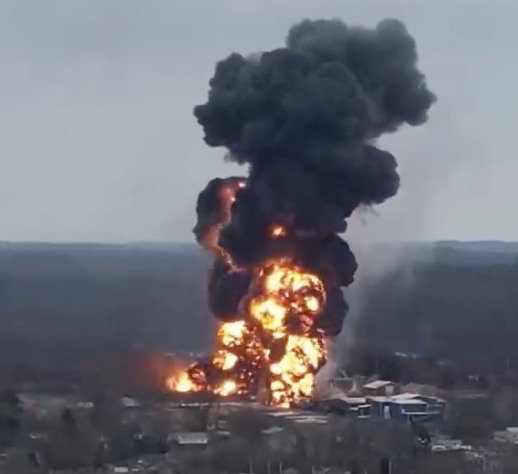Vinyl chloride is a colorless gas used to make make polyvinyl chloride, the hard plastic resin in plastic products, like credit cards, car parts, PVC pipe and more.
Vinyl chloride exposure is associated with an increased risk of a rare form of liver cancer as well as brain and lung cancers. Burning it sends phosgene, a toxic gas that was used as a weapon during World War I, and hydrogen chloride into the air.
Toxins like volatile vinyl chloride, as well as phosgene and hydrogen chloride, were known to be aboard. But other toxins were also in the cars of the train traveling from Illinois to Pennsylvania, ABC News reported.
The additional chemicals released into the air and soil after the fiery crash, included ethylene glycol monobutyl ether, ethylhexyl acrylate and isobutylene, according to the outlet, citing the US Environmental Protection Agency.
The vinyl chloride contents of five rail cars were unstable and the cars were at risk of exploding, which could have launched deadly shrapnel into the air. To prevent an explosion, Norfolk Southern executed a controlled release of the vinyl chloride around 3:30 p.m. Feb. 6.
The gas was slowly released into a trough that was then set on fire, creating a large plume above East Palestine. Flames and black smoke could be seen above the village until late in the afternoon. The EPA said it is continuing to monitor the air quality.
They only evacuated people in a **1 mile** radius of the Ohio train crash site
— DC_Draino (@DC_Draino) February 13, 2023
The toxic acid rain cloud has a 200 mile radius (that we know of)
Now you know why the media won’t talk about this disaster pic.twitter.com/gAXEaK0wJ8
Norfolk Southern Corporation announced in a press release that the company is providing over $1 million to over 700 families in East Palestine who were impacted by the mandatory evacuation. A shelter-in-place was ordered for residents within 1-2 miles of the derailment on February 5 – who knows what they had inhaled.
According to the press release, costs include reimbursements and cash advancements for lodging, travel, food, clothes and other related items.
Norfolk Southern submitted its remedial action plan on Monday, detailing its response to the train derailment in East Palestine, Ohio, and what it plans to do next.
In the plan, submitted to the Ohio Environmental Protection Agency, the company said it will install wells to monitor groundwater and sample soil in the Ohio village.
Residents were allowed to return home last week after about 50 train cars, ten of which carried hazardous materials, derailed in a fiery wreck on Feb. 3. Vinyl chloride, a gas contained in five of the cars, was released and burned to prevent explosion, causing toxic fumes to be released in the area.
Norfolk Southern has a history of lobbying against safety regulations. The publicly traded company, which has a market value of $55 billion, fought the Federal Railroad Administration’s push to upgrade the “Civil War era” brake system that remains widely used in American trains, and against stricter rules on the transport of hazardous materials.
Safety concerns have also grown amid Norfolk Southern’s implementation of “precision scheduled railroading,” an operations policy criticized as a corporate money grab. To cut costs, the company has slashed jobs by more than a fifth since 2017, ignoring concerns that understaffing could impact railway safety, while also initiating a $10 billion stock buyback program.
Millions of dollars in corporate lobbying and poor regulations have created the perfect storm, according to Railroad Workers United (RWU), a cross-union rail workers’ caucus. Yahoo News
